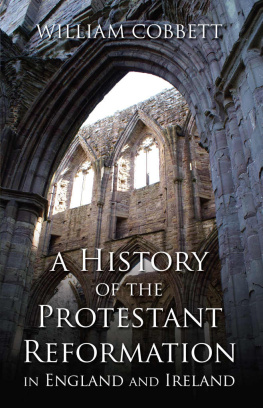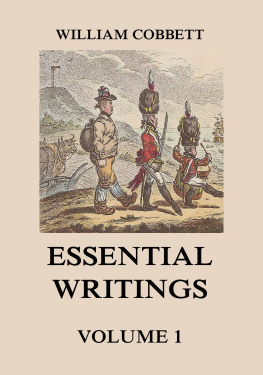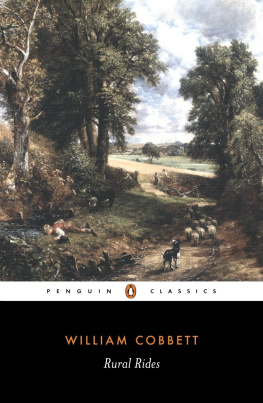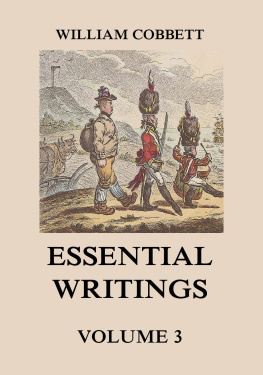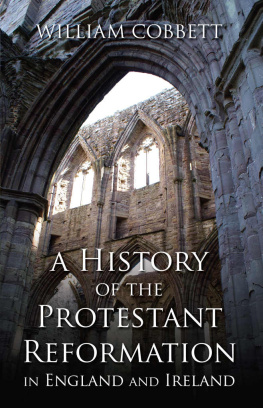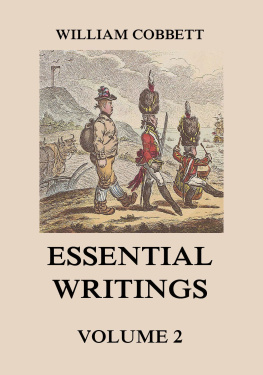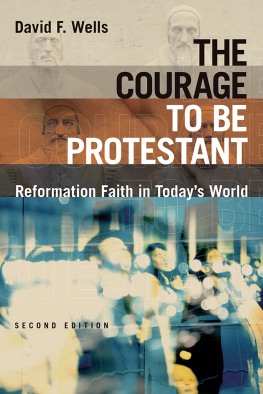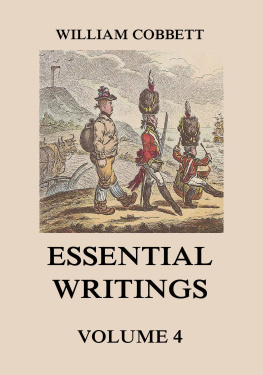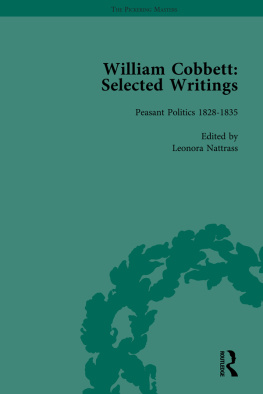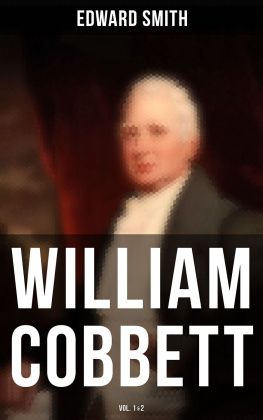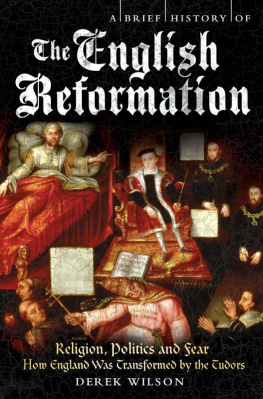William Cobbett - History of the Protestant Reformation in England and Ireland
Here you can read online William Cobbett - History of the Protestant Reformation in England and Ireland full text of the book (entire story) in english for free. Download pdf and epub, get meaning, cover and reviews about this ebook. year: 2015, publisher: TAN Books, genre: Religion. Description of the work, (preface) as well as reviews are available. Best literature library LitArk.com created for fans of good reading and offers a wide selection of genres:
Romance novel
Science fiction
Adventure
Detective
Science
History
Home and family
Prose
Art
Politics
Computer
Non-fiction
Religion
Business
Children
Humor
Choose a favorite category and find really read worthwhile books. Enjoy immersion in the world of imagination, feel the emotions of the characters or learn something new for yourself, make an fascinating discovery.
- Book:History of the Protestant Reformation in England and Ireland
- Author:
- Publisher:TAN Books
- Genre:
- Year:2015
- Rating:3 / 5
- Favourites:Add to favourites
- Your mark:
- 60
- 1
- 2
- 3
- 4
- 5
History of the Protestant Reformation in England and Ireland: summary, description and annotation
We offer to read an annotation, description, summary or preface (depends on what the author of the book "History of the Protestant Reformation in England and Ireland" wrote himself). If you haven't found the necessary information about the book — write in the comments, we will try to find it.
William Cobbett: author's other books
Who wrote History of the Protestant Reformation in England and Ireland? Find out the surname, the name of the author of the book and a list of all author's works by series.
History of the Protestant Reformation in England and Ireland — read online for free the complete book (whole text) full work
Below is the text of the book, divided by pages. System saving the place of the last page read, allows you to conveniently read the book "History of the Protestant Reformation in England and Ireland" online for free, without having to search again every time where you left off. Put a bookmark, and you can go to the page where you finished reading at any time.
Font size:
Interval:
Bookmark:
A History of the Protestant Reformation
In
England & Ireland
William Cobbett
This edition is photographically reproduced from the 1896 edition of Benziger Brothers, New York.
Library of Congress Catalog Card Number: 88-51240
Cover design by Milo Persic, . Cover images: Tintern Abbey, Wales Milo Persic.
TAN Books
Charlotte, North Carolina
www.TANBooks.com
2012

The ruins of St. Mary's Abbey, York, founded in 1098 and dissolved on November 26, 1539 when William Dent, 29th and last abbot, surrendered the monastery into the hands of Thomas Cromwell. ( Grateful acknowledgments to Tom Gardiner, who took this photograph in 1988 .)
PREFACE.

WILLIAM COBBETT, the author of The History of the Protestant Reformation , a new edition of which is here published, needs no introduction. His name, writes Sir Henry Lytton Bulwer, is that "of a man, who, whatever his faults, must be considered, by every Englishman who loves our literature or studies our history, as one of the most remarkable illustrations of his very remarkable time." Born on the 9th of March, 1766, of poor parents, near Farnham in Hampshire, William Cobbett quickly aspired to something higher than that for which the circumstances of his country life promised to afford him scope. From the task of frightening birds from the turnip fields, and weeding the walks and flower-beds in the garden of the Bishop of Winchester at Farnham Castle, in which his boyhood was spent, he made his way to London at the age of seventeen. Here for a brief time he was engaged as a lawyer's clerk, but finding the occupation not to his taste, he enlisted in a regiment intended for Nova Scotia. During the period of nearly eight years in which he served in the ranks, he acquired what he always regarded as his most valuable possession, a thorough knowledge of the English language. "I learned grammar," he says himself, "when I was a private soldier on the pay of sixpence a day. The edge of my berth or that of the guard-bed was my seat to study on, my knapsack was my bookcase, a bit of board lying on my lap was my writing-table, and the task did not demand anything like a year of my life."
We are not here concerned with following the varied career of our author, and only refer to the early portion of it to show that he was intimately acquainted with the condition of the lower classes in England at the time when he wrote his History of the Protestant Reformation . When the letters, in which form the history first appeared, were written, it required great courage and determination to undertake so unpopular a task as that of attacking the establishment of Protestantism, and even of pointing out that much could be said, and ought in all fairness to be said, for the Catholic side of the question. Proposals for Catholic emancipation were then much discussed, and it was in "the heat of the contest and cry against the Catholics" that Cobbett boldly stepped forth and called the Reformation "a devastation," and proclaimed "the Protestant religion to have been established by gibbets, racks, and ripping knives."
The merit of the work as a history has been much discussed and frequently denied, even by those who might be tempted to take Cobbett's conclusions as in the main correct. The words of Sir Henry Lytton Bulwer on the subject may be quoted: "The History of the Protestant Reformation," he writes, "turned out a more important production than was ever contemplated by the author, whose chief aim seems to have been a contemptuous defiance to all the religious and popular feelings in England. The work, however, was taken up by the Catholics, translated into various languages and widely circulated throughout Europe. The author's great satisfaction seems to consist in calling Queen Elizabeth 'Bloody Queen Bess,' and Mary, 'Good Queen Mary,' and he doubtless brought forward much that could be said against the one and to favour the other, which Protestant writers had kept back; but his two volumes still are not to be regarded as a serious history, but rather as a party pamphlet, and no more racy and eloquent party pamphlet was ever written."
How far the verdict of Sir H. Lytton Bulwer that the work in question is "not to be regarded as a serious history" is correct, must be left to the judgment of those who will take the trouble to examine into the authority of Cobbett's statements of fact. For the purpose of this edition I have been at some pains to enquire into the truth of the assertions made, and to set down the result in the shape of notes, either giving authorities which may be taken to bear out the writer's statements, or pointing out wherein in my opinion he was mistaken, or has somewhat misstated or exaggerated the bearing of some fact. I confess that I was surprised to find how few were the instances in which some satisfactory authority could not be found to bear out the picture presented in Cobbett's pages. In great measure the author evidently drew his materials from the History of England by Dr. John Lingard, a work that had been published not long before this History of the Protestant Reformation was undertaken. It is impossible to compare the two books without seeing that Cobbett must have had before him, and must have closely followed, Lingard's presentment of the facts with which he was immediately concerned. Not only is there a general accord between them, which cannot have been the result of mere chance, but in many places there is almost a verbal agreement.
The fact that Cobbett has relied in the main upon so careful and, as is very generally allowed, so exact, calm and judicial a writer of history as Dr. Lingard, will probably be sufficient to clear him in the opinion of most people from the reputation of being "a reckless perverter of facts," and his general history from the charge of being "a mere tissue of lies." The chief value of The History of the Protestant Reformation would seem, however, to lie, not in the actual accuracy of this or that fact, but in the general impression made upon the mind of the reader. The author's vigorous and graphic style presents a real picture of the results, so far as the people of England as a whole are concerned, of the revolution social as well as religious which is known as the Protestant Reformation. The genius of Cobbett instinctively realised that the religious changes in England in the sixteenth century, if not actually promoted by those in power for their own purposes, had certainly resulted in benefiting the rich to the detriment of their poorer brethren. In fact, wholly apart from the religious side of the question, or from any advantages which may be thought to have been secured by the triumph of Protestantism, the price paid for the change by the lower classes must in fairness be estimated as very considerable. Viewed merely in its social aspect, the English Reformation was in reality the rising of the rich against the poor. In the general upheaval which accompanied the labours of the Reformers to root up Catholicism from the soil of England, most of those in place and power were enabled to grow greater in wealth and position, whilst those who had before but a small share in the good things of this world came in the process to have less. Their condition under the new order was visibly harder, till as a natural result of their misery there came forth many of the social sores which afflict society to the present day. What Cobbett's History of the Protestant Reformation chiefly displays, then, is this aspect of the religious changes in the sixteenth century. His pages help us to realise the fact that the Reformation effected, besides a change in religious beliefs and practices, a wide and permanent division in the great body politic. The supposed purification of doctrine and practice was brought about only at the cost of, as it were, driving a wedge well into the heart of the nation, which at once and for all divided the rich from the poor, and established the distinction which still exists between the classes and the masses.
Next pageFont size:
Interval:
Bookmark:
Similar books «History of the Protestant Reformation in England and Ireland»
Look at similar books to History of the Protestant Reformation in England and Ireland. We have selected literature similar in name and meaning in the hope of providing readers with more options to find new, interesting, not yet read works.
Discussion, reviews of the book History of the Protestant Reformation in England and Ireland and just readers' own opinions. Leave your comments, write what you think about the work, its meaning or the main characters. Specify what exactly you liked and what you didn't like, and why you think so.

